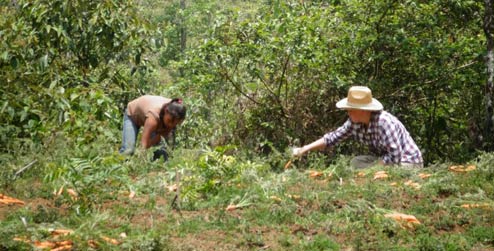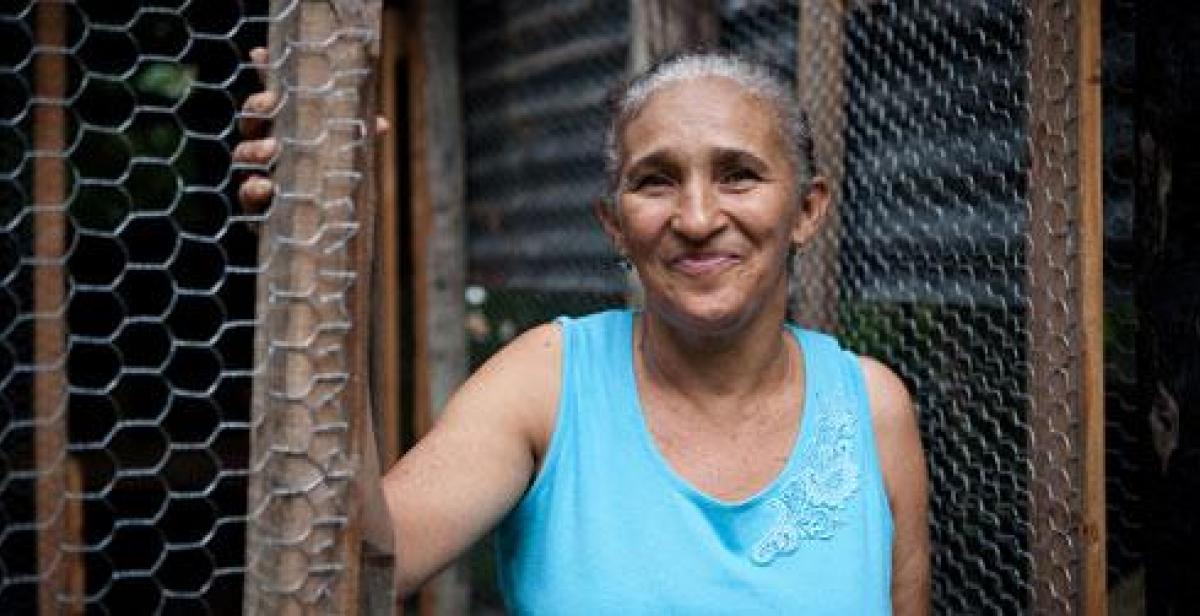The International Day of Rural Women has been celebrated since 2008. Every 15 October, we come together to recognise the contributions of women living in rural communities around the world. Those contributions include enhancing rural development, improving food security and eradicating rural poverty.
Rural women play a critical role in both developed and developing countries. They often take a leading responsibility in producing crops, caring for livestock, providing food, water and fuel for their families, and engaging in off-farm activities to diversify their families’ livelihoods. On top of this, rural women also care for children, older people and the sick.
#ThanksForDinner

On International Day of Rural Women, we are running the #ThanksForDinner campaign to raise awareness about how much of our daily food comes from rural women.
To get involved, all you need to do is…
1. Take a picture of yourself with it
2. Tweet it and put it on Facebook with #ThanksForDinner and #RuralWomen anytime on Wednesday 15 October
3. Click here and donate £5 to help us support rural women around the world
Make sure you tag us so we know you've done it!
International Day of Rural Women – Who is it all about?
One rural woman we are incredibly excited to celebrate is Milagros Gomez. Milagros has always done her best to help others. She has funded herself to train as a community nurse – not because she will earn anything from it, but because “it is a rewarding role and I am committed to helping the most vulnerable”.
“I do not mind that I cannot find salaried work. I’m very happy and satisfied with what I do as a health promoter,” she says.
Thanks to training from Progressio’s Karina Cuba, Milagros advises others on food safety, nutritional health and how to grow more and better quality food.
“The communities in the border area are forgotten by all, especially the government,” she says. “I want to do what I can to support more people, especially families with children.”
One practical way is through improvements in the quality and variety of crops that people grow in their ‘home gardens’. Milagros is one of 24 women who Karina has trained in sustainable food production and management of their home gardens.
Milagros has also been helped with building materials and advice to construct a chicken coop. “I’m really proud of the effort I’ve made to build this henhouse,” she says. “It’s one of the larger chicken coops in the area and many people from the community now come to me and ask for advice.”
Milagros received 10 hens through the project’s ‘revolving fund’ and will breed from the hens and return 10 chicks to the fund, to be given to another farmer.
“It means I don’t have to buy eggs: there’s enough for my family, and I can even give eggs to my neighbours or exchange them for other products. Many other women in the community are interested in raising chickens, because they can see the benefits of it,” says Milagros. “It’s so important to continue this work. We must continue to support rural women’s associations, which receive little support and are usually excluded or marginalised.”
Milagros is a fantastic example of why International Day of Rural Women is a day worth celebrating. We feel any chance to draw attention to the achievements of Milagros and the thousands of women striving to provide for their families in rural communities around the world should be taken.
International Day of Rural Women - Who do we work with?

Gender inequality is a big problem in Honduras. The social structure introduced by Spanish colonialism has created a misogynistic society where women are seen as lower than men. Even the work they do is considered to be inferior.
Progressio is helping by teaming with local organisations in Honduras such as Cooperativade Mujers Campesinas de La Paz (Cooperative of rural women of La Paz), COMUCAP. COMUCAP is made up of 259 women, divided into 16 divisions across the La Paz region. They provide technology and land for the women of the community to work on collectively. COMUCAP’s social objective is to promote equality of leadership and economic opportunities working towards self-sustainability and the protection of the environment.
The women have been taught how to use all their resources, including making their own organic fertilisers, which in turn helps them to grow better quality produce and is better for their health. COMUCAP has collective farms, but is planning for women to buy their own plots from the organisation, which will ensure they will get more money in the long run. The income the women are earning as a result of their new skills is changing their lives and those of their families. For example, all the children of COMUCAP women now go to school, which is rare in a rural Honduran community.
Recently, volunteers from Progressio helped COMUCAP farmer Alba to harvest her carrot crop, increasing the income she could receive and the time she had to spend with her family.




Comments
International day of rural women
I had no idea this existed.